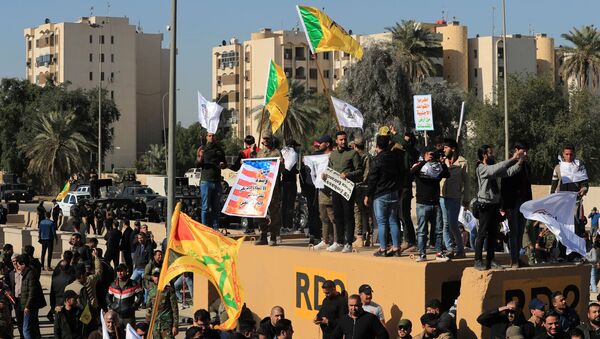Several hundred protesters stormed the International Zone (IZ) in central Baghdad on Tuesday, laying siege to the US Embassy there and prompting police to fire tear gas into the crowd.
#BREAKING: Thousands of Iraqis mostly #IRGC backed #PMU members are now protesting in front of #US Embassy in #GreenZone,#Baghdad. They have set its wall & entrance on fire & are trying to enter its building. If they enter the building, #Iraq Special Forces will open fire at them pic.twitter.com/4jrMBAxN2K
— Babak Taghvaee (@BabakTaghvaee) December 31, 2019
The protesters were ostensibly angry about a series of US airstrikes the previous day against the Iraqi Shiite militia Kata'ib Hezbollah that killed 25 militia members and injured 51 other people. Those airstrikes, in turn, came in response to an attack on the US base in Kirkuk, Iraq the day prior that killed a US contractor. The Iraqi government has strongly condemned the US airstrikes, noting their agreement with Washington doesn’t allow unilateral military actions.
The episode echoed a previous incident late last month in which protesters burned down the Iranian consulate in Najaf, placing an Iraqi flag atop it. However, Tehran at the time rejected the notion it was Iraqi protesters who orchestrated the attack, saying it was “an organized attack,” Sputnik reported.
Widespread reports Tuesday portrayed the people attacking the US embassy as part of the protest movement that has rocked Iraq for months, forcing Prime Minister Adel Abdul-Mahdi to pledge his resignation and seeking answers for widespread unemployment, lack of infrastructure and social investment and government corruption. Hundreds of protesters have died in the violent clashes with police and with other groups and thousands more have been injured.
Basma Alawee, founder of the Iraqi Activists Society and the Florida Refugee Organizer for "We Are All America"; and Maestro Karim Wasfi, president and founder of Peace Through Arts Global Foundation and former conductor of the Iraqi National Symphony Orchestra, told Radio Sputnik’s By Any Means Necessary Tuesday that the protesters who attacked the US embassy aren’t those who have been camped out in Tahrir Square across the river from the IZ for months on end, but rather the same groups who have been massacring those peaceful protesters.
“Sadly, now people start to care. We have been asking the world leaders and human rights organizations to step in since October 1,” Alawee told hosts Sean Blackmon and Jacquie Luqman. “We lost over 600 peaceful protesters, and I don’t have the numbers of the people who’ve been kidnapped.”
Alawee noted that “the groups who are attacking the US embassy in Iraq are the same groups attacking the unarmed protesters in Iraq,” including Asa'ib Ahl al-Haq and Saraya Tali'a Al Khurasani, two Shiite militias that are part of the Iraqi Popular Mobilization Forces.
“They were not smart enough, they had their flags up, they had their own leaders on the ground, and then we hear on the news that these peaceful protesters [are] the ones who’s doing that,” Alawee told Sputnik. “Actually, these same people are the people who’ve been killing our peaceful protesters.”
“I don’t think this was unexpected. I don’t know why people are surprised,” Wasfi told Sputnik. “No one was hiding the fact that the militants or the militia leaders who were out there publicly stating their state of function and how they won’t relate to these elections, how they won’t relate to protesters and protesting, how they won’t relate to … the US presence in Iraq.”
“It was inevitable that the tension would reach a level of what we have seen in the last few hours,” he said, noting the existence of a report from three days ago, before even the Kirkuk attack, that set this sequence of events in motion, warning that demonstrators might march “into the area of the IZ.”
“The simple fact is, basically, I think, the Iraqi representation of ‘a government’ has shown enough double standards” in how it relates to other countries’ involvement in Iraq, Wasfi said, noting that “other nations” apart from the US have also exercised influence over Iraqi affairs.
“We don’t have a strong government in Iraq who invests in their own people,” Alawee said. “We have governments who are hand-by-hand with other countries in killing their own people. So it’s really sad to see now the world asking what’s happening in Iraq.”
Alawee said the world is typically only concerned about Iraq’s oil.
“Now the world is [concerned] about the American embassy. We’ve been mobilizing, we’ve been organizing, we’ve been meeting with elected officials and educating them about what’s happening, and there was no follow-up emails, no concern shared with the Iraqi community here in the US. And now today you see many of these elected officials and the president and many people in power tweeting and posting and sharing concerns about what’s happening in Iraq. I mean, we’ve been talking about this since October.”

